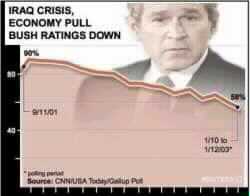The United States and Britain warned Iraqi leader Saddam Hussein that his time to disarm was running out, but UN weapons inspectors insisted they needed longer to find proof Iraq was hiding banned weapons. Some 150,000 US ground, air and naval personnel are set for deployment to the Gulf region by mid-February, but the White House maintains no timetable has been set for an attack.
"I'm sick and tired of games and deception," an impatient President George W. Bush said as he received Polish President Aleksander Kwasniewski at the White House.
British Foreign Secretary Jack Straw jumped to Bush's side, saying in London he had been "right to put it in that way.
"(UN) Security Council resolution 1441 sets out a very clear pathway to a peaceful resolution of the Iraqi crisis but it requires the full and positive compliance by Saddam Hussein."
Bush's harsh words appeared at odds with earlier comments by chief UN weapons inspector Hans Blix hinting he was not as keen as the US president to rush to judgement.
Blix told the Washington Post a progress report by his staff to the UN Security Council due January 27 would mark "the beginning of the inspection and monitoring process, not the end of it."
Blix also announced separately the deployment of 60 new inspectors to Iraq and said they would continue working there at least until March, when he is due to present another, more detailed report to the council.
Bush had earlier described the January 27 report as the start of "the final phase," leading to a US decision on whether to use military might to force Iraq to give up its alleged nuclear, chemical and biological weapons programs.
Blix and International Atomic Energy Agency chief Mohamed ElBaradei are due in Baghdad this weekend for talks with their inspectors and with Iraqi officials.
ABC News meanwhile quoted unnamed sources as saying Bush was preparing to take his case for war to the United Nations soon after January 27 regardless of the inspectors' preliminary findings.
Iraqi Foreign Minister Naji Sabri, following up on Blix's admission last week that no "smoking gun" had yet been found, told Iraqi satellite television, "The inspectors have come and found nothing. And if they stay on and search every corner of Iraq, they will find nothing because there is nothing for them to find."
Annan Still Believes War Can Be Avoided
Amid the signs of the Bush administration's growing impatience for action, UN Secretary General Kofi Annan said he still believed Baghdad could be disarmed without a war.
"I am both optimistic and hopeful that if we handle the situation right and the pressure on the Iraqi leadership is maintained, and the inspectors continue their work aggressively, we may be able to disarm Iraq peacefully without going to war," he said.
He warned the consequences of a military attack on Iraq "could be quite substantial and negative," notably in the numbers of refugees it would produce.
EU Too Is For A Diplomatic Solution
The hardening of Washington's tone also brought European governments' differences over Iraq to the fore.
European Commission President Romano Prodi, addressing the European Parliament in Strasbourg, France, urged EU governments to take a common approach to avoid war in Iraq, except as a last resort.
But Swedish Prime Minister Goeran Persson was pessimistic all 15 EU member states could agree a common policy.
"The differences are too great," he told Danish newspaper Politiken. "The EUs foreign policy capacity is no larger than what all the members can agree upon. The truth is, we have a divided picture. The British have one line, the Germans another, and the French a third."
France Confirms Opposition to War
French Prime Minister Jean-Pierre Raffarin meanwhile told parliamentarians in Strasbourg that his government's opposition to war had not changed.
Raffarin implicitly criticised Washington's claim that the all-important UN Resolution 1441 could alone trigger military action if Iraq is deemed to have obstructed inspections.
"If there is going to be use of force, there will have to be a deliberation other than that for 1441, because the source of international law -- essential for us -- is at the UN and the Security Council," he said.
Schroeder Favors A Second UN Resolution
German Chancellor Gerhard Schroeder said he too favored a second UN resolution before using force against Baghdad, although he has already promised US and NATO forces the use of German bases and air space and German troops to help crew AWACS surveillance planes over Turkey.
UN Experts Inspect 10 Suspected Iraqi Sites
UN arms experts meanwhile inspected 10 suspect sites in Iraq as they dug in for a long haul and prepared to receive more reinforcements to bolster the hunt for any banned weapons programs.
Blix said his teams had found cases where Baghdad had imported weapons-related material in violation of UN Security Council resolutions.
"Whether these discoveries or these items are related to weapons of mass destruction is a matter that we still need to determine," he said
PHOTO CAPTION
President Bush's attempts to juggle a soft economy, a potential war with Iraq and a nuclear standoff with North Korea are taking a toll on his political standing, as Democrats line up to challenge him for reelection. A Gallup poll released on January 14, 2002 showed Bush with a 58 percent overall approval rating among Americans, down from 63 percent a week earlier and from a record high of 90 percent in mid-September 2001, when Americans rallied around their president after the Sept. 11, 2001, attacks. (Reuters Graphic)
- Author:
& News Agencies - Section:
WORLD HEADLINES


 Home
Home Discover Islam
Discover Islam Quran Recitations
Quran Recitations Lectures
Lectures
 Fatwa
Fatwa Articles
Articles Fiqh
Fiqh E-Books
E-Books Boys & Girls
Boys & Girls  Hajj Rulings
Hajj Rulings Hajj Fatwas
Hajj Fatwas














